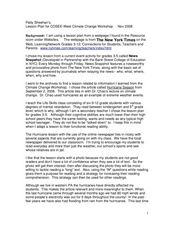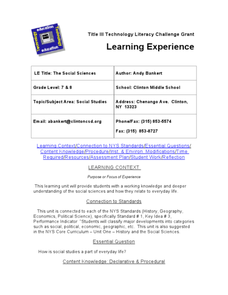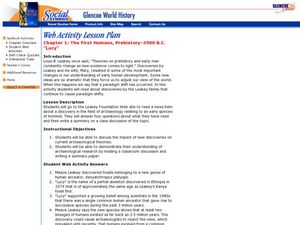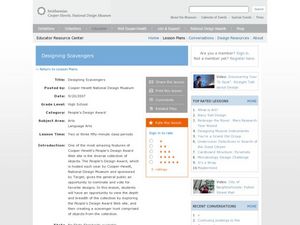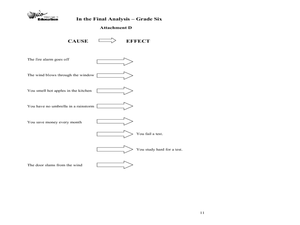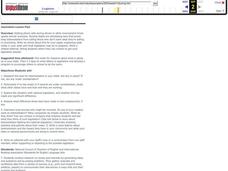Curated OER
Reading the Newspaper
Students explore how to find needed information about community events, resources, and employment. Students identify headlines, datelines, and sections of the newspaper. They participate in a newspaper treasure hunt. Students read and...
Curated OER
Book: Crossing the Seas
As learners read each chapter of Eric Schwartz's Crossing the Seas, they analyze the actions of United States in Venezuela, Hawaii, Cuba, the Philippines, Puerto Rico, and the intent of the Monroe Doctrine. They then compare...
Alabama Department of Archives and History
Alabama's Secession in 1861: Embraced with Joy and Great Confidence. Why?
From December 20, 1860 to June 8, 1861, eleven states seceded from the Union. Alabama seceded on January 11, 1861. Why did so many white Alabamians want to secede? Why did they believe the South could win the war? These are the essential...
Curated OER
Holocaust Unit
Learners read a book about World War II and the Holocaust while in small literature circles. They write journal entries and news articles based on the reading.
VH1
Lesson 4: Behind the Movie Chicago
The elements of music and journalistic integrity in one lesson; What could be better? The class discusses journalistic approaches to better understand responsible reporting versus sensationalism. They watch the Act One from the film...
Curated OER
Moral Development in Camus' The Stranger
“In the depth of winter, I finally learned that within me there lay an invincible summer.” Readers of The Stranger rate Mersault’s moral development (or lack thereof) using Kohlberg’s Theory of Moral Development scale. Using...
Civil War Trust
Uncle Tom's Cabin
Through a careful reading and examination of Harriet Beecher Stowe's Uncle Tom's Cabin, scholars take part in grand conversations about the novel's contents, slavery, and the impact the book had on it. Furthermore,...
Society for Science & the Public
Easter Islanders Made Tools, Not War
When studying artifacts, especially tools, how do archaeologists determine what the devices were used for? In what ways might researchers' previous experiences influence their perception of an artifact? An article about researchers'...
Curated OER
Book: Super Power: Americans Today
Students, after reading Chapter 1 in the book, "Super Power: Americans Today," analyze the recognition of the quote, "Hunger does not breed reform; it breeds madness and all the ugly distempers that make an ordered life impossible," by...
Missouri Department of Elementary
Dealing with Peer Influence: What Are Bullying and Harassment?
Scholars examine examples of peer pressure and discuss how specific actions negatively affect one's well-being. Learners gather in small groups to write two scenarios in which peer pressure is used. They reference the STAR method in how...
Curated OER
West Climate Change
Students read an internet article about hurricanes. In this hurricane lesson, students explain how they form and the damage they bring. They analyze the article and answer questions about it.
Curated OER
From Whose Perspective?
Students critically analyze news coverage of Palestinian-Israeli violence by comparing information from a variety of news sources. They compose expository essays reflecting on how to obtain accurate, unbiased, and credible information.
Curated OER
Focus on the Media
Students critically examine news articles and editorials for attitudes of discrimination and prejudice. Students then complete checklist in which they analyze news reports for context, content, point of view, language, graphics, and...
Curated OER
The Social Sciences
Students search for examples of social science in and around their school. They create a Social Science scrapbook of the eight social sciences, that includes news articles and summaries that focus on each social science area.
Curated OER
The First Humans: Prehistory-3500 B.C. "Lucy"
Young scholars explore prehistoric times by completing web activities in class. In this human ancestry lesson, students identify the archaeological discovery of the "Lucy" skeleton and what it meant for science. Young scholars...
Curated OER
Comeback Kid: Embraer has hot new jet
Students read an article from USA Today and participate in discussions and activities. In this reading comprehension lesson plan students analyze the article is from the money section of the newspaper and discusses the aircraft...
Curated OER
Designing Scavengers
Students write a headline that captures the most important aspects of the People's Design Award. For this design lesson, students are introduced to The People's Design Award and collaborate to create a headline for a newspaper article....
Newseum
Slanted Facts and Slippery Numbers
The Internet is known as the information superhighway, but sometimes it's hard to know when to hit the brakes on unreliable sources. Using a well-rounded lesson plan, pupils read and summarize articles about the gender pay gap and...
Curated OER
The Final Analysis: Cause and Effect, Fact and Opinion
Middle schoolers read and review informational texts, analyze cause and effect, and distinguish fact from opinion. They assess a "one-minute mystery" you read aloud for cause and effect relationships. Resource includes complete set of...
Curated OER
Nellie Bly's Newspaper Club: Introducing the Art of Writing
Students use video and the Internet to research the life of Nellie Bly, a famous female reporter from the 19th century. They research a writer and present their information to the class in the style of a news reporter.
Curated OER
Lesson: Double Album: Sentence as Thought
The cut-up technique invented by surrealist artist Tristan Tzara is the focus for today. Young artists examine the technique and analyze its use in relation to expressing and viewing the world. They then use a newspaper to create a...
Curated OER
Tuning Out Telemarketers
Students research laws for telemarketers in their state, examine whether there are effective laws in other states, explore concept of national telemarketing legislation, and write news features about telemarketers and impact they have in...
National Endowment for the Humanities
“Read All About It”: Primary Source Reading in “Chronicling America”
Can investigative journalism become too sensationalistic and accusatory, or is it vital for the survival of a democracy? Middle schoolers analyze primary source documents from early 20th-century newspapers as well as Theodore...
Beyond Benign
SLS Today
Lather is not necessary for an effective shampoo. After learning of the industry created consumer misinformation, individuals investigate the toxicity of the most popular additive in shampoos to create lather. They use their results to...












